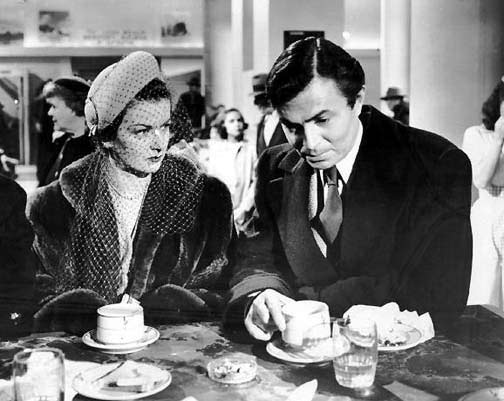 Now, to move on to The Reckless Moment (1949) - this has never been a film that I'd really pegged down as essential (although The Deep End certainly provoked my interest.) Perhaps it's because Ophüls' American work is forever overshadowed by the brilliance of Letter from an Unknown Woman (1948)? Well, let's get this straight: The Reckless Moment is most definitely the equal of its acclaimed predecessor - and I'm tempted to stick my neck out on the line and say that I might even prefer the later film.
Now, to move on to The Reckless Moment (1949) - this has never been a film that I'd really pegged down as essential (although The Deep End certainly provoked my interest.) Perhaps it's because Ophüls' American work is forever overshadowed by the brilliance of Letter from an Unknown Woman (1948)? Well, let's get this straight: The Reckless Moment is most definitely the equal of its acclaimed predecessor - and I'm tempted to stick my neck out on the line and say that I might even prefer the later film.Apparently, this is both a film noir and a melodrama. Great, but those terms belie the fact that this is also a psychosexual thriller and a surprising examination of post-war bourgeois life. Perhaps the best description of this would be a noir of domesticity, where the idyllic suburban home is subverted into a menacing cascade of eerie shadows and claustrophobic commodities that inhibit the comfort of this perfect lifestyle (hence, Mrs. Harper's constant need to escape this environment.) Ophüls gets a kick out of toying with audience expectations here: one of the film's most mesmerizing sequences - [Spoiler:] Mrs. Harper's removal of the dead body - unfolds on-screen in virtual silence. The director brilliantly strips his cinema to its barest essentials, revealing how the power of narrative + image is a far more potent solution than the exaggerated string accompaniment that Hollywood believes should be taking place at this moment.
The characterizations here are as brilliant as any others in the cinema of Ophüls, and keep well in tone with the director's concern with subversion: at some point (perhaps in the drugstore?) our heroine (Mrs. Harper) and our villain (Donnelly) meet in the middle, causing a gradual merging of their filmic roles - it's as if Mrs. Harper's rigid adherence to maintaining order and her refusal to reveal emotional complexity (until the astonishing conclusion) provokes a transposition of her audience identifiability onto Donnelly, who accordingly thwarts his criminal role and veers the film into a universal hymn for the socially entrapped. Thus, when The Reckless Moment concludes by conforming to the character trajectories that the viewer initially expected, we're left in shock. Hell, I'm still in shock now. Rarely have I seen films that are so damning of the status quo, nor have I come across a "happy ending" quite like this: with the "happy" so thoroughly undermined. How appropriate then, that it was the great Max Ophüls who was responsible for this audacious effort.
Oh, and just to quickly say that both Joan Bennett and James Mason are perfect here. And I found the representation of the black maid character here so refreshing, given the context. Bravo!
No comments:
Post a Comment